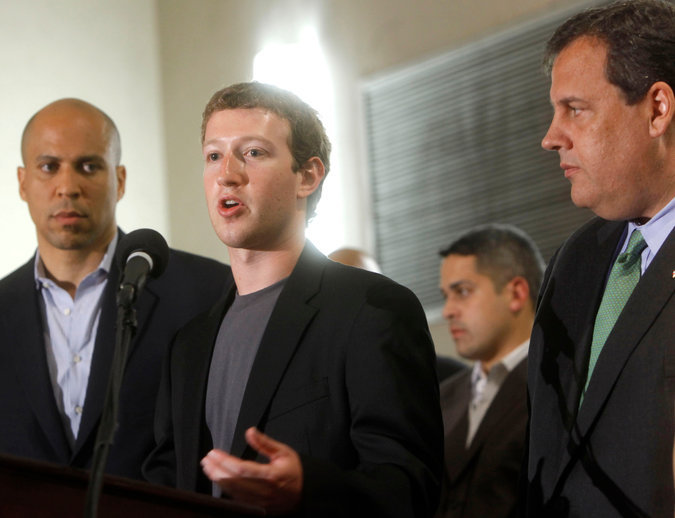Yesterday, this article was published on Huffington Post at:
Here is a copy of the article, for those who don't want to go on Huffington Post's website.
The Prize: Who's in Charge of America's Schools?
by Owen M. GriffithIn 2010, Mark Zuckerberg, from Facebook, Chris Christie, then Governor of New Jersey and Corey Booker, who was the Mayor of Newark at that time, joined forces in an attempt to transform the failing Newark school system with the help of $100 million grant from Zuckerberg and his wife. At that time, fewer than 40 percent of third through eight graders in the Newark public schools were reading or doing math at grade level and almost half the students did not graduate high school. The system was obviously broken and needed to be drastically changed.
In a compelling new book, The Prize: Who's in Charge of America's Schools, Dale Russakoff chronicles this ambitious and audacious plan, with its big failures and smaller victories.
The trio of Zuckerberg, Christie, and Booker came in to try to flip this school system, predicting that within five years, they would have a national model for turning around any big urban school system that needed help. Russakoff wrote, "Their stated goal was not to repair education in Newark but to develop a model for saving it in all of urban America."
The Prize,’ by Dale Russakoff - The New York Times
Russakoff,
a longtime Washington Post reporter, had the good sense to recognize
the potential power and import of this story early on, and so embedded
...
|
Remove preview
Well, it has been five years and the results are in, the dramatic transformation did not take place, but some more modest improvements were made, primarily in the charter school sector of Newark.
Things did not start off smoothly. The first big mistake was the way this project was announced. The teachers, students, and citizens of Newark heard about this project on the Oprah Winfrey Show, when the rest of the country first heard about the $100 million dollar donations. Newark residents thought they should have been notified about the proposal and also been included in formulating the plan.
After he announced his $100 million donation to the cause, Zuckerberg said, "We are setting up a $100 million challenge grant so that Mayor Booker and Gov. Christie can have the flexibility that they need to implement new programs and turn Newark into a symbol of educational excellence for the whole nation." Thus, with the matching grant, they doubled their money. But more money did not ensure success.
Another problematic area was in the renegotiation of teacher contracts. Zuckerberg wanted to be able to reward teachers who were doing a good job and get rid of the teachers who were not. Like some business leaders, he wanted to apply his "business" model to education. However, efficiency, taken as the "business" model, does not always address the complexities of educational reform.
One of his big areas of concern was trying to get "bad" teachers out. Unfortunately, Zuckerberg was not aware that teacher's jobs were often protected by seniority laws in the state of New Jersey and the teacher's union was one of the most powerful lobbies in the legislature. When they went to reform the law, they were able to implement some of their new ideas, but that main issue, getting rid of "bad" teacher, could not be changed at all.
Furthermore, out of the $100 million, a large portion of that was supposed to go directly to a substantial increase to teacher's salary. However, $20 million dollars went straight to high paid consultants, who were getting as much as $1,000 per day. One educator named these consultants, the "school failure industry." Contrast the consultant's pay with the Newark teachers, who eventually received a paltry $3,000 stipend added to their salaries that translated to about $10 per hour.
On the other hand, the biggest success in this entire project was expanding charter schools in Newark who are performing at higher rates of achievement than the Newark city schools. Enrollment in charter schools, like the KIPP Academy, went from 20% to 40% by 2015. Russakoff reports that one reason for charter school's success is that they get more money to the students. The public schools get about $10,000 of the $19,000 allocation to each student, whereas the charter schools get an average of $13,000-14,000 of the $19,000 to each student. This enables charter schools to give students more academic support and also to assist families with additional resources.
NPR Fresh Air
“One
of the most audacious exercises in education reform” – is how
journalist Dale Russakoff describes the plan to fix the schools in
Newark, New Jersey, a city ...
|
Remove preview
In a compelling interview, Russakoff said the discrepancy with allocation of money going to students is due to waste in the Newark schools system that charter schools are able to avoid. Appropriately, Russakoff likened this to the difference between FedEx and the US Postal Service.
Yet even with this modest success, there was a price to pay. With so many Newark students going to charter schools, enrollment went down for the other public schools and thus, the available funds also plummeted.
And what has happened to Mark Zuckerberg's educational philanthropy? Did this sour his resolve to help schools? No, it appears he has learned a lesson and Zuckerberg currently works with local school in San Francisco Bay area. Now, he is including and working collaboratively with the educational communities in these improvement projects.
With this collaboration, in high-poverty school in the Bay area, Zuckerberg is expanding the reach of his money, creating a "web of support for students," allocating some funds for mental health and medical support, realizing that school reform needs to take a broader approach, attempting to improve the entire lives of these families. It will be interesting to see the results of this new collaboration.


No comments:
Post a Comment